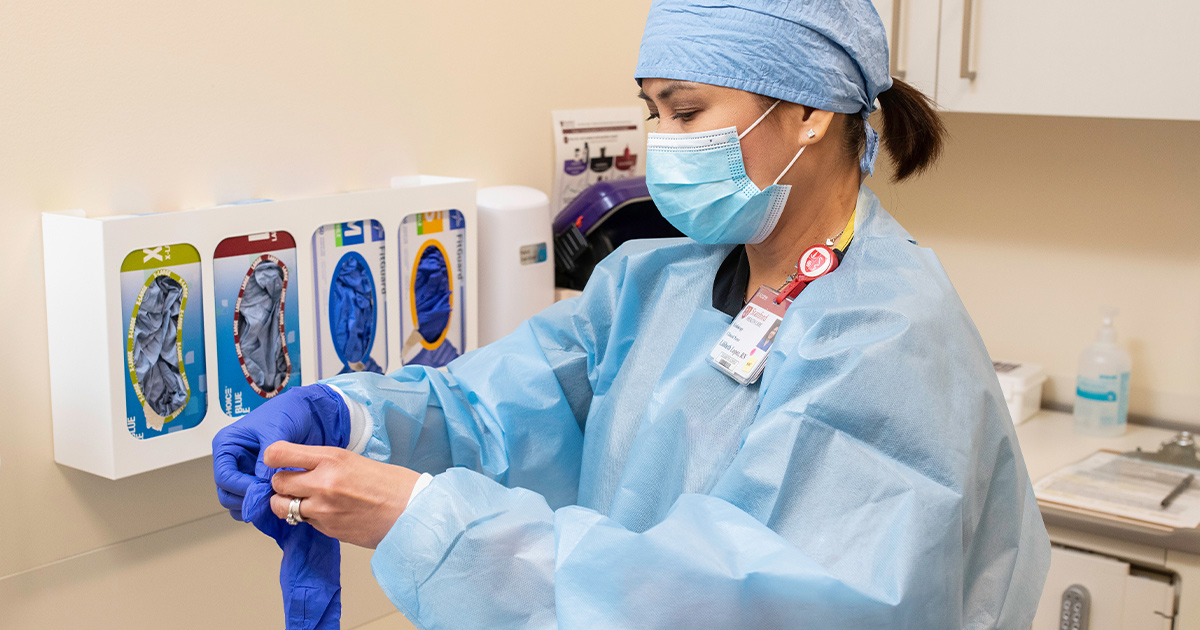Celiac Disease Program
Part of Digestive Health Center

Leaders in Celiac Disease Treatment
We offer one of only a handful of centers in the US and the only one in Northern California with dedicated specialists who focus solely on treating and studying celiac disease. Our doctors are experts on treating rare forms of the disease and managing complications.
420 Broadway Street
Pavilion D, 2nd Floor
Redwood City,
CA
94063
Phone: 650-736-5555
What We Offer You for Celiac Disease
- Specialized expertise in treating celiac disease, including rare forms such as refractory celiac disease, which doesn’t respond to traditional treatment. Go to Conditions Treated
- Advanced treatment options, including customized diet plans, that take into account your unique needs and preferences. Go to Treatments
- Team-based approach to treatment with gastroenterologists and nutritionists working together to coordinate the most effective plan for you. Go to Your Care Team
- Clinical trials for celiac disease that offer eligible patients access to the latest technology and treatments not widely available at other medical centers. Go to Clinical Trials
- Comprehensive support services such as nutrition and lifestyle counseling for managing celiac disease. Go to Support Services
- Ease of access to celiac disease specialists at our new Redwood City location for coordinated care close to home and work. Go to Accessing Care
Celiac disease is a hereditary autoimmune disorder in which consuming gluten causes an immune reaction in the small intestine. The condition prevents nutrients from being properly absorbed and causes other symptoms that affect your quality of life and overall health.
We offer advanced, comprehensive care for people with celiac disease to help manage this chronic condition. Our specialists work with the nationally renowned clinical nutrition experts at our Gastrointestinal (GI) Nutrition Services Program.
Depending on your specific needs, we may use one or more treatment options to give you the best results. Our expertise includes care for:
Celiac Disease
Related Conditions
Our gastroenterologists treat all stages of celiac disease, including:
- Preclinical celiac disease: In this earliest stage of the disease, people experience symptoms such as abdominal pain, bloating, constipation, diarrhea, nausea, or excessive gas. Because these symptoms are common in other gastrointestinal conditions, our specialists use advanced diagnostic tests to confirm celiac disease and rule out other conditions.
- Newly diagnosed celiac disease: People often come to us for further testing after a positive blood test for celiac disease. Our gastroenterologists conduct a full assessment, which may include an endoscopy. We use the most advanced endoscopic devices and techniques, many of which were developed at Stanford. We also use the most accurate antibody testing available to help avoid false positive test results.
- Non-celiac gluten sensitivity / non-celiac enteropathy: People with this disorder do not have celiac disease, yet they experience discomfort when they consume gluten. Our specialists can confirm a diagnosis and provide treatment to relieve symptoms.
- Non-responsive celiac disease: In this rare form of celiac disease, people who have been following a gluten-free diet for more than a year still experience symptoms.
- Refractory celiac disease: This rare type of non-responsive celiac disease may lead to non-Hodgkin’s lymphoma in a very small percentage of cases.
- Intestinal malabsorption and micronutrient deficiency: When celiac disease is severe and non-responsive, such as in refractory celiac disease, the intestine is unable to absorb nutrients as effectively.
People with celiac disease may be more likely to develop other conditions, such as:
- Anemia: Celiac disease damages the small intestine, the part of the digestive tract that absorbs key vitamins and minerals such as vitamin B12 and iron. Low levels of these nutrients can cause anemia, a blood disorder in which the body does not produce enough red blood cells. Our doctors collaborate with our Hematology Program and Endocrinology Clinic to treat this condition.
- Osteoporosis: Damage to the intestines from celiac disease may also prevent calcium from being absorbed, which can weaken bones and lead to osteoporosis. We work closely with endocrinologists at our Endocrinology Clinic and the team at our Osteoporosis and Metabolic Bone Diseases Clinic to prevent or treat osteoporosis.
- Thyroid dysfunction: Celiac disease can lead to other autoimmune disorders, particularly thyroid dysfunction such as Graves’ disease. Our gastroenterologists will work with the doctors at our Endocrinology Clinic to screen you and provide treatment for any thyroid disorders.
- Non-Hodgkin’s lymphoma: In rare cases, refractory celiac disease can cause non-Hodgkin’s lymphoma, a cancer of the lymphatic system. If you have refractory celiac disease, we will work with the team at our GI Cancer Prevention Program to reduce your risk of cancer. If you’ve developed lymphoma from refractory celiac disease, we will closely collaborate with oncologists at our GI Cancer Program and Lymphoma Program to coordinate care for both diseases.
Our gastroenterologists treat all stages of celiac disease, including:
- Preclinical celiac disease: In this earliest stage of the disease, people experience symptoms such as abdominal pain, bloating, constipation, diarrhea, nausea, or excessive gas. Because these symptoms are common in other gastrointestinal conditions, our specialists use advanced diagnostic tests to confirm celiac disease and rule out other conditions.
- Newly diagnosed celiac disease: People often come to us for further testing after a positive blood test for celiac disease. Our gastroenterologists conduct a full assessment, which may include an endoscopy. We use the most advanced endoscopic devices and techniques, many of which were developed at Stanford. We also use the most accurate antibody testing available to help avoid false positive test results.
- Non-celiac gluten sensitivity / non-celiac enteropathy: People with this disorder do not have celiac disease, yet they experience discomfort when they consume gluten. Our specialists can confirm a diagnosis and provide treatment to relieve symptoms.
- Non-responsive celiac disease: In this rare form of celiac disease, people who have been following a gluten-free diet for more than a year still experience symptoms.
- Refractory celiac disease: This rare type of non-responsive celiac disease may lead to non-Hodgkin’s lymphoma in a very small percentage of cases.
- Intestinal malabsorption and micronutrient deficiency: When celiac disease is severe and non-responsive, such as in refractory celiac disease, the intestine is unable to absorb nutrients as effectively.
close Celiac Disease
People with celiac disease may be more likely to develop other conditions, such as:
- Anemia: Celiac disease damages the small intestine, the part of the digestive tract that absorbs key vitamins and minerals such as vitamin B12 and iron. Low levels of these nutrients can cause anemia, a blood disorder in which the body does not produce enough red blood cells. Our doctors collaborate with our Hematology Program and Endocrinology Clinic to treat this condition.
- Osteoporosis: Damage to the intestines from celiac disease may also prevent calcium from being absorbed, which can weaken bones and lead to osteoporosis. We work closely with endocrinologists at our Endocrinology Clinic and the team at our Osteoporosis and Metabolic Bone Diseases Clinic to prevent or treat osteoporosis.
- Thyroid dysfunction: Celiac disease can lead to other autoimmune disorders, particularly thyroid dysfunction such as Graves’ disease. Our gastroenterologists will work with the doctors at our Endocrinology Clinic to screen you and provide treatment for any thyroid disorders.
- Non-Hodgkin’s lymphoma: In rare cases, refractory celiac disease can cause non-Hodgkin’s lymphoma, a cancer of the lymphatic system. If you have refractory celiac disease, we will work with the team at our GI Cancer Prevention Program to reduce your risk of cancer. If you’ve developed lymphoma from refractory celiac disease, we will closely collaborate with oncologists at our GI Cancer Program and Lymphoma Program to coordinate care for both diseases.
close Related Conditions
Our team of experts focuses solely on caring for people with celiac disease. Gastroenterologists and nutritionists who specialize in treating celiac disease collaborate to determine a personalized treatment plan that fits into your lifestyle.
INNOVATION HIGHLIGHTS
Research conducted at Stanford has contributed to a better understanding of the component of gluten that activates the immune response in celiac disease. The team also identified enzymes that break down enough gluten to prevent an inflammatory reaction when it is eaten. This has led to promising new drugs that may be helpful to those who continue to struggle with celiac, despite following a gluten-free diet.
Advanced Diagnostics
Because the symptoms of celiac disease can resemble those of other medical conditions, an accurate diagnosis is crucial. Our gastroenterologists are experts at identifying celiac disease using leading technology to give you an accurate diagnosis. Our superior diagnostics include:
- Advanced endoscopy: Stanford is one of the few sites in the nation that offers deep enteroscopy, also called balloon-assisted endoscopy. This procedure provides doctors a more complete view of the digestive tract than other methods. We use this advanced technology in special cases, and our gastroenterologists work with advanced endoscopists to conduct the procedure. Endoscopic procedures are performed at our Digestive Health Endoscopy Suite.
- Advanced microscopy: Our doctors look at intestinal cells while shining fluorescent light through microscope. This test aids in determining the severity of celiac disease.
- Antibody testing: Many blood tests for celiac disease can produce false positive results. At Stanford, we use tests that give the most accurate results available.
- Genetic testing: Most people with celiac disease carry either one or both genes identified as increasing the risk of developing the disease (HLA DQ2 and HLA DQ8). Not all people with these genes will develop celiac disease. We use genetic testing to confirm whether your symptoms are related to celiac disease and determine whether first-degree family members need regular antibody screening or genetic testing for the condition.
All Treatments
Our gastroenterologists and registered dietitians work closely with you and with experts from the GI Nutrition Services program. We get to know you, so we can develop a personalized nutrition plan that takes into account your food preferences and lifestyle to help you maintain the plan.
Medical nutrition therapy
The only treatment for celiac disease is a gluten-free diet. Avoiding gluten helps heal the lining of your small intestine, relieves symptoms, and helps your body efficiently absorb nutrients from food. Your doctor and care team provide ongoing supportive care to help you manage this chronic condition for optimal health.
Pain Management
We partner closely with the Gastrointestinal (GI) Pain Clinic to provide relief for painful celiac disease.
Multivitamins and mineral supplements
As your intestines heal, your body will begin to absorb more nutrients. We will test your blood regularly to check levels of vitamins and other nutrients in case you need supplements. If needed, we will prescribe:
- B vitamins
- Iron
- Vitamin D
- Zinc
Clinical Trials
We offer one of the nation’s most robust clinical trial programs for celiac disease. These research studies evaluate new medical approaches, devices, drugs, and other treatments.
As a Stanford Health Care patient, you may be eligible to participate in open clinical trials. Open trials refer to studies that are currently recruiting participants or that may recruit participants in the near future. Closed trials are not currently enrolling, but similar studies may open in the future.
Your Care Team
Our doctors collaborate with nurses, registered dietitians, and other health care providers to develop and implement the most effective care plan for you. Because our digestive health services are centralized at our Redwood City location, you can often see multiple specialists during the same visit.

Your Doctors
Gastroenterologists
Gastroenterologists specialize in diagnosing and managing conditions that develop in the gastrointestinal tract, including the mouth, esophagus, stomach, intestines, liver, gallbladder, and pancreas. Our gastroenterologists have extensive training and experience managing celiac disease and a variety of gastrointestinal conditions.
View All {0} GastroenterologistsEndocrinologists
Endocrinologists specialize in diagnosing and treating hormone-related conditions, including autoimmune disorders that may result from celiac disease. If you develop a second autoimmune disease or thyroid disorder, these doctors work closely with your care team to manage your health.
Hematologists
Hematologists specialize in conditions affecting the blood, bone marrow, and lymphatic systems. These doctors work closely with your care team if celiac disease leads to anemia, and in rare cases, lymphoma.
Pathologists
Pathologists examine tissue samples taken through an endoscopy or a biopsy to determine the presence of a wide variety of diseases. A highly trained pathologist on our team views samples of intestinal tissue under a microscope to look for celiac disease or monitor how the intestine is responding to a gluten-free diet.
Radiologists
Our radiologists are experts in imaging the intestinal wall to determine the extent of damage caused by celiac disease.
Stanford is an Academic Medical Center, which is a type of hospital setting where doctors teach the entire spectrum of medical education. Students range from beginning medical students to fully licensed and practicing doctors completing advanced sub-specialty training. Stanford Medicine is a partnership between Stanford University School of Medicine and Stanford Health Care. Since Stanford is a teaching hospital, you can expect to meet many providers and providers in training.
- Attending Physician: a doctor who supervises doctors in training or in medical school
- Fellow: a doctor doing postgraduate level work and specializing in care of patients with specific conditions
- Resident: a doctor who has graduated from medical school and is in training (also called “residency”) here at Stanford. A resident is also called an intern
- Medical Student: a student who is currently enrolled in medical school with the goal of becoming a doctor

Extended Care Team
Working with our celiac specialists, our extended care team includes nurse practitioners. They use their advanced skills in digestive health to assist with diagnosis, treatment, and follow-up care.
ADVANCED PRACTICE PROVIDERS
Most people with celiac disease have the HLA DQ2 or HLA DQ8 gene. Our genetic counselors may recommend testing people with celiac disease and their family members for these genes.
Nurse coordinators guide you through the entire process and help manage all components of your care. They schedule appointments, handle disability and insurance paperwork, and coordinate with the finance office and social workers, if needed.
After a celiac disease diagnosis, you will need to follow a specific, gluten-free diet. Our food and nutrition experts work with you to make healthy changes to your eating habits in a sustainable way.
DIETITIANS
Our doctors participate in research to advance the understanding and treatment of celiac disease. Research coordinators help screen candidates for possible participation in clinical research trials.

Support Services
We offer a wide variety of support services to assist and guide you through diagnosis of and treatment for celiac disease. A dedicated team will help coordinate all aspects of your care.
- Case Management
- Financial Counseling
- Guest Services
- Integrative Medicine (acupuncture, massage)
- Interpreter Services
- Nutrition Services
- Spiritual Care
- Stanford Health Library
- Outpatient Psychiatry Clinic
Accessing Care
The Digestive Health Center provides seamless access to all of Stanford's digestive health services — from diagnostic evaluation to treatment and follow-up. We make every effort to coordinate your appointments, so that you can see multiple providers, as needed, during a single trip to our Redwood City location.
Frequently Asked Questions
We participate in a wide range of insurance plans. View the list of insurance plans accepted by Stanford Health Care
Have insurance or pre-authorization questions? The Patient Financial Clearance team is available Monday – Friday, 8 a.m. – 5 p.m., to answer your questions. Please call 650-724-4445 or 1-877-291-7335 (toll free).
When choosing a doctor, it’s important to consider the doctor’s clinical training, experience and expertise in a specialized area that matches your health care needs.
You can find the right Stanford doctor for you by using our doctor directory and filtering the results based on a medical category, specialty, or doctor’s last name. View our list of our Celiac Disease Program doctors
At Stanford, we take care of the details so that you can focus on your health and wellness. Our gastroenterologists work as a team with device nurses, advanced practice providers, registered dietitians, and imaging technologists to coordinate every aspect of your care. We also offer a wide range of support services to promote healing and improve your quality of life. Learn more about our support services
You can call the Celiac Disease Program directly to schedule an appointment with one of our doctors. Call 650-736-5555 to make an appointment.
Yes, Stanford Health Care offers financial assistance for patients who are uninsured or underinsured. Meet with one of our financial counselors to find the best approach to paying for your health care. Financial counselors are available Monday through Friday from 7:00 a.m. – 6:00 p.m. Learn more about financial assistance services
Managing treatment for Celiac is a highly personalized process. Our care team guides you every step of the way, including:
- What to expect and what to bring on the day of your appointment
- Maps, directions, parking, public transit options, and contact information
- Suggested questions to ask your doctor
For your first appointment, you should plan to bring any related test results and your medical history to share with your doctor. Our clinic receptionists will confirm the information you should bring with you prior to your first appointment.
You will also need to have the following information with you when you check in:
- Insurance card
- A form of payment for any co-pays or deductibles
- One form of photo ID:
- Valid state-issued driver’s license
- Valid state-issued ID card
- Valid passport
- Valid U.S. Military ID card
- Valid U.S. Permanent Resident Card
The Celiac Disease Program is located at the following address.
Directions and Parking information for the Celiac Disease Program:
Celiac Disease Program
420 Broadway Street
Pavilion D, 2nd Floor
Redwood City, CA 94063
Phone: 650-736-5555
Please plan to arrive 20-30 minutes prior to your appointment time due to construction near the Redwood City campus. This will allow you plenty of time to park, locate your clinic and complete any additional paperwork.
Please print, fill out, and return the Medical Record Release Form to your new patient coordinator. The medical release form is an authorization form for external facilities to release medical records to Stanford Health Care.
Always feel free to bring someone with you to your appointments. A family member or friend can help ask questions, remember the information your care team gives you, and provide support.
Write down your questions before your appointment and rank them in order of importance, beginning with the most important ones. If there isn’t enough time to have all your questions answered during your appointment, ask your doctor who you can speak with to get your other questions answered.
You have multiple options when it comes to paying your bill.
- Pay Online:
- You can log in to MyHealth or the MyHealth mobile app to see and pay your bill.
Already have an account but need help logging in?
Contact the MyHealth Help Desk
- You can also pay as a guest to pay your bill without logging in.
- Pay by mail:
- Stanford Health Care
P.O. Box 740715, Los Angeles, CA 90074-0715
Los Angeles, CA 90074-0715
- Stanford Health Care
- Pay by Phone:
- You can call our Patient Billing Customer Service Office
1-800-549-3720.
- You can call our Patient Billing Customer Service Office
For our latest business hours and for more information about billing, visit our Billing page.
At Stanford, we take care of the details so that you can focus on your health and wellness. Our gastroenterologists, neurologists, surgeons, and otolaryngologists work as a team with device nurses, advanced practice providers, registered dietitians, and imaging technologists to coordinate every aspect of your care. We also offer a wide range of support services to promote healing and improve your quality of life. Learn more about our support services
Please call our clinic receptionists at 650-736-5555. They are available Monday through Friday, 8:30 a.m. to 5:30 p.m. to help you reschedule or cancel your appointment.
To determine if a clinical trial is right for you, talk to your doctor. He or she can refer you to a research coordinator for more information on studies that may be right for your specific condition.
You can also find the guidelines for who can participate in a particular clinical trial online. However, it is best to work with your doctor to decide the right care approach for your needs.
View list of open Celiac Disease Program clinical trials at Stanford
Many of our programs are available to international patients.
Our International Medicine Services team can help you find the right doctor, estimate medical costs, book travel, and get you information about Stanford programs and services.
Please call +1 650-723-8561 or email IMS@stanfordhealthcare.org to get started.
For Referring Physicians
PHYSICIAN HELPLINE
Fax: 650-320-9443
Monday–Friday, 8 a.m.–5 p.m.
Stanford Health Care provides comprehensive services to refer and track patients, as well as the latest information and news for physicians and office staff. For help with all referral needs and questions, visit Referral Information.
You may also submit a web referral or complete a referral form and fax it to 650-320-9443 or email the Referral Center at ReferralCenter@stanfordhealthcare.org.


